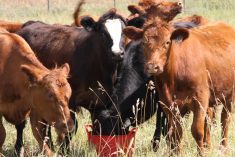PICTURE BUTTE, Alta. – Tax reform in Alberta has some farmers worried their tax notices will drive them out of business.
“Any drastic changes to farm assessment will have a drastic effect on all Alberta and still won’t resolve the inequity problems,” said Susan Aris, reeve of the Municipal District of Pincher Creek.
A provincial government committee is reviewing farm taxation and assessment policy. The deadline for submissions is Nov. 18. Its report is due in January.
The result must not devastate rural Alberta with unfair taxes, said Aris during a public forum last week in Picture Butte attended by about 120 people. She said farmers have limited ability to pass the added cost of higher taxes to their customers.
Read Also

The Western Producer Livestock Report – November 6, 2025
Western Producer Livestock Report for November 6, 2025. See U.S. & Canadian hog prices, Canadian bison & lamb market data and sales insights.
The committee said reform is not a tax grab but a way to readjust how revenue is collected.
“I’m concerned about accusations a new tax system will devastate Alberta,” said southern Alberta MLA Barry McFarland.
Alberta farmland assessment is based on the property’s productive value when used for the production of field crops. Other than residences, all buildings used for farming operations are exempt from assessment and subsequent taxation when located in a rural municipality.
The government has offered tax options for discussion. These cover the valuation standard for farmland assessment, agricultural improvements, residential improvements, assessments of woodlots, assessment of land not used for farming and a business tax on farming operations.
Several presenters said municipalities should have the right to apply a business tax to a farm.
In southern Alberta’s livestock industry, the need to pay for road maintenance is becoming a critical issue. The County of Lethbridge made a landmark decision earlier this fall to impose a business tax on intensive agriculture to cover some of these infrastructure costs.
Intensive farming operations don’t require a lot of land but generate a higher income compared to grain farms, even though a traditional farm may pay nine times more tax than an intensive livestock one.
Eugene Wauters, councillor for the County of Lethbridge, defended the business tax bylaw and said taxes on intensive livestock operations should be applied uniformly across the province.
Livestock producers in the county may challenge the business tax in court and are worried differing tax regimes may create regional disparities. The provincial government should take more responsibility for this issue, said Rick Paskal, a feedlot owner at Turin.
“I cannot afford taxes levied against me and by the provincial government and expect to stay in business,” said Paskal.
He proposed a special rate for feedlots. A portion of the property could be assessed and the mill rate assessed at double the lowest mill rate on the whole farm.
Several speakers suggested the province pressure the federal government to return a greater share of fuel taxes to repair roads.
The province has taken an aggressive approach to building up production and these businesses have already added tax revenue to the province, said Bob Kruger, dairy farmer and chair of the Alberta Milk Producers. He agreed that intensive agriculture should be taxed fairly across the province.
“Agriculture should be treated in a holistic approach and there should be recognition for the different service levels in the urban and rural communities,” he said.
Norm Ward, president of the Western Stock Growers Association, questioned the real motive for business taxes on intensive livestock.
“We’re concerned that the business tax not be used as a zoning tool. You may not be able to get zoning through to control feedlots but you may be able to tax the hell out of them so they’ll move,” said Ward.
He also wanted to know how the government planned to deal with grain condominiums or feed mills in towns versus feed mills of equal capacity located at a feedlot. The location may differ but both mills use the same infrastructure.
The stock growers suggested the amount of taxes levied on farmland be related to the amount of municipal services that land receives.
In addition, they said the province should pay for 90 percent of the cost of secondary and primary roads. The money might have to come from other areas.
The time may have come for the province to reexamine tax exemptions on purple fuel, the group said. It may be time for farm vehicles to use clear fuel rather than purple gas to raise additional tax dollars.















